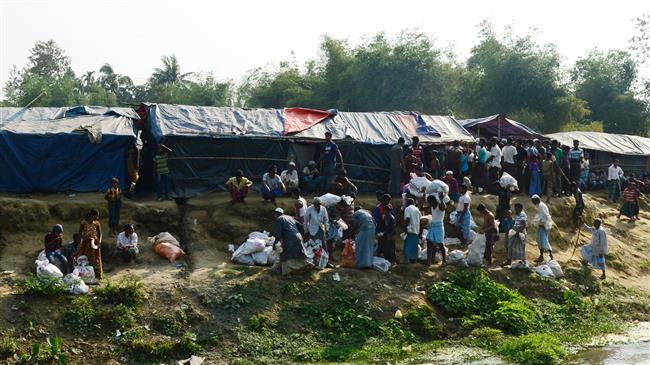
RNA - Fayezul Islam Mondol, coast guard commander in the southeastern town of Teknaf, said on Thursday that the rescued included 14 men, 10 women and nine children who had been living in refugee camps in the southeastern Bangladesh district of Cox's Bazar,
"We have captured six traffickers as well. All of them are Bangladeshis," Mondol said.
The Rohingya rescued had boarded a dilapidated fishing trawler on an uncertain "sea voyage to Malaysia," he added.
The boat was intercepted on Wednesday evening by a coast guard boat in the Bay of Bengal near Saint Martin's Island, the last territory of Bangladesh.
Authorities in Bangladesh worry many refugees may once again risk travelling to Southeast Asia by boat, a route previously popular among Rohingya Muslims seeking economic opportunities outside the crowded camps.
The new departures come as Myanmar prepares to take some of the refugees back after agreeing with Bangladesh to start repatriation on Nov. 15.
The plan has met with widespread opposition from Rohingya, who say they will not return without guarantees of basic rights, including citizenship and freedom of movement.
The United Nations has said conditions in Rakhine are not conducive for returns and the special envoy on human rights, Yanghee Lee, on Thursday urged a halt to the “rushed plans.”
Chris Lewa, director of the Arakan Project, which has a network of sources across Rohingya communities, said the threat of being sent back to Myanmar could be pushing refugees to turn to smugglers.
“The Rohingya are trapped,” she said. “They have nowhere to go. No one wants them, and now they face on top of that the threat of repatriation.”
Last year, extremist Buddhist monks rushed to help Myanmar’s military, when it intensified its crackdown.
The campaign against the Rohingya, which the UN described as a textbook example of ethnic cleansing, has seen mass killings, torture, and gang-rape of the Muslims as well as arson attacks against their homes and farms in Rakhine.
Hundreds of thousands of Rohingya Muslims have been living for more than a year in cramped refugee camps in southeastern Bangladesh after fleeing violence in Rakhine at the hands of the Myanmar military.
Dozens of Rohingya Muslims flee Rakhine by boats
On the other side of the border in Sittwe, the capital of Rakhine, aid workers and local leaders said they had received information that at least four boats had departed since the start of October. Some of those boarding the boats were women and children joining other family members.
“The living conditions in the camp are very bad and there’s not enough food to survive,” said Kyaw Hla, a Rohingya leader from Thae Chaung camp outside Sittwe, where he said one boat carrying some 80 people had left last week.
“People are not able to stand against all these troubles, so they are deciding to leave,” he said. "There’s no hope for us here.”
Tens of thousands of Rohingya have been languishing in internal displacement camps since a previous wave of violence in 2012.
For years, Rohingya on both sides of the border have boarded boats in the dry months between November and March, when the sea is calm.
The perilous journey to Thailand and Malaysia, often undertaken in rickety vessels, has cost many lives.
Myanmar's government has faced international condemnation for failing to halt the brutal persecution of Rohingya Muslims by military forces and Buddhist extremists.
Rohingya trace their presence in Rakhine back centuries, but most people in Buddhist-majority Myanmar see them as unwanted immigrants from Bangladesh, with the state denying the Muslims citizenship.
847/940